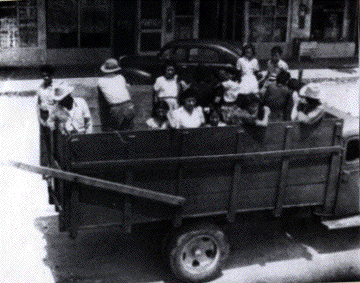
Truckload
The Cotton Harvest
The corrido "Las Pizcas de Algodón" satirizes the hardships of the
South Texas cotton
pickers. In the first lines of the corrido, the corridista explicitly
draws attention
to presenting the corrido to the audience:
Este corrido, señores,
lo he cantado en plantación,
donde sufren las pelonas
en las pizcas de algodón.
The first two lines of the stanza will function as the llamada inicial.
Here the
corridista introduces the plantation where the "pelonas" or flappers
suffer. The
word pelona in its literal sense means the bald woman. Already, the
corrido begins
its appeal to humor. In the following stanzas, the protagonist is
exhilarated to begin work
on the cotton plantations because there he would see the flappers. He then
says
with excitement :
Ay, que caray!
Yo ya me voy
para Victoria
d' onde yo soy.
This will become a common refrain (estribillo) throughout the corrido that will allow
the audience
to identify with the protagonist's feelings during harvest time. The
worker then
gets his provisions and heads for his destination in his car that he claims
is in
great condition. Again, the humor of the corrido appears in the
description of the car.
The car is stated to be in excellent condition with the exception of a few
main
parts such as the tires, connecting rods and a good windshield. At this
point, the
refrain is repeated; however, this time the name of the city is changed.
Once more, the
audience is able to relate to the hardships of the migrant laborer. To
continue,
the protagonist tells of the suggestions made by others to make his car run
better.
Suggestions such as taking the hood off and taking out the radiator add to
the humor of the
worker's traveling accomodations.
In the next stanza, the labor contractors are portrayed as tempting
employers who
create a deceitful web for the seasonal workers. The workers are warned by
the protagonist
not to trust the labor contractors because they will exploit them once
under contract:
A toditos les encargo
antes que se dejen creer:
que se cuiden de esos gallos
porque los van a vender.
Through this mensaje, the humoristic tone of the corrido changes to a
serious tone when the
idea of unfair labor practices is mentioned. Shortly thereafter, the
corrido continues in a humoristic
tone. The protagonist rates the women on the plantations by their kisses
and ends the first part of the corrido
by singing another refrain.
The second part of the corrido begins with the protagonist getting in
trouble with a flapper.
He takes her to the plantation without giving her gloves and because of
this she throws a lime at him.
This is significant because the worker and the flapper pretend the cotton
harvest is like a
grand dance in which they are expected to attend. In the following stanza,
the travel motif is introduced
through the verse dyad:
Corre,corre maquinita,
no te vayas a quedar;
The central theme of this corrido lies in the idea of travel. Many of the
migrant workers felt a
certain anticipation before moving from plantation to plantation. For
this reason, the worker does not
want his car to breakdown. He anticipates arriving at the next plantation
and meeting more women.
The corrido then continues with his car speaking to him. It is a very hot
day and the car begs for rest.
Through this speech event, one can also see this as a line a person
working in the fields would say. The
personification of the
car brings humor to the corrido, but it also allows people to compare the
car's actions with that of
a field workers. The car is struggling to get to the next plantation just
as the worker is working hard in the
fields to do the same.
After all of the food and women's make-up is gone, the worker leaves
because the
thrill of working in the fields is also gone. This traveling from
place to place may appear to be all fun and games, but when it comes down
to it; it is agonizing work.
The worker leaves a final warning to the flappers:
Yo les digo a mis pelonas,
ya no vayan a sufrir;
ya me
di una toreada,
que no me podía venir.
Again, we hear this urgent message from the protagonist. Don't be fooled
by the excitement of travel because
once you stop, the thrill is gone. Another warning is posed to the
protagonist's friends in the final stanzas of the corrido.
Y a mis amigos también
les hago esta
observación:
no se vayan a engañar
porque es muy duro el
tirón.
This recurring message helps people understand the harsh reality of
working in the fields.
At the closing of the corrido, the corridista bids farewell by saying he
had lots of satisfaction in
singing the corrido of the cotton harvest. Throughout this corrido, the
satiristic tone gives laughs to the
audience while dealing with a very serious issue: migrant labor.
In the final stanza, the refrain is used to help the audience identify
with the corrido.
The listening audience is able to say, "Hey, I understand where he's
coming from. That's me!"
Cathy Vasquez
UT History student
Las Pizcas de Algodón Pt.1
Las Pizcas de Algodón Pt.2
Bibliography
Return to Main Menu

